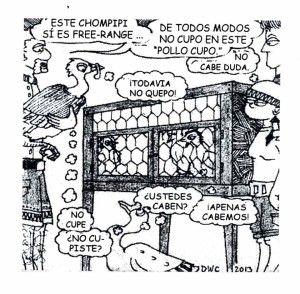The Zen of Caber and Cupo
 The word room was in our first-grade spellers. So why are we forever mistranslating this word?
The word room was in our first-grade spellers. So why are we forever mistranslating this word?
I have discussed in a previous column “smurfy” Spanish verbs. Well, room is a smurfy English noun, so if you think our language is never smurfy, get over it.
Room, when you think about it, can be abstract or concrete. The former is usually easy to translate. The latter is not hard, except that there are beaucoup equivalents.
For abstract room, we usually use espacio. This is the Spanish word, certainly, for star-studded and celestial space. But it also works for the leftover space in a half-eaten bag of Doritos, the margins on this page, and even the space between these lines.
One type of abstract space not covered by espacio is the delimited room sought by passengers on a 747 and by applicants to a college. This we call el cupo. Joey’s mom may have wanted him to be a Cub Scout, but by the time she got to the table to sign him up, it was too late. What happened? Cupo limitado. But he would find cupo in the tabloids.
Now what about those more concrete rooms, those you can make with actual concrete?
A room whose function is generic or not yet known is un cuarto (which also means fourth). But when we need more specificity, a cuarto could be or become un dormitorio (bedroom), un comedor (dining room), or sala/un living (living room, pronounced LEE-been). Reader, I will leave you to guess at the etymology of this last word.
Salas are also considered relatively small and lockable rooms, including anything from la sala de baños (bathroom) to la sala de tribunal (courtroom). Un salón is bigger and more public than any sala, a place for conventions or workshops.
La cámara works wherever we say chamber, e.g., cámara de combustión, cámara de gas, cámara alta/baja, and las cámaras de jueces (which is always plural). The U.S. Senate is a cámara alta.
A hotel room of any quality is una habitación, unless it is una suite, pronounced sweet. Reader, you are on your own about the etymology of this one, too.
When none of the above words seems to fit, I will use aposento, which seems to overlap with most of the above. But it also means theater box.
Speaking of theater, I once had to translate the lyrics for Some Enchanted Evening (from South Pacific). My helper thought that the “crowded room” could be a dance hall, and therefore un salón concurrido.
So much for nouns. But how do we express actions involving room? That calls for caber, a verb which totally violates Coop’s Law of Conjugation. This law (still unrecognized by the Spanish Royal Academy, but this could change any day) states: “A verb’s frequency of usage is inverse to its simplicity of conjugation.” It is among the 11 most irregular verbs in Spanish. But unlike the others, we do not hear caber daily. Yet it has no substitute.
Let us say you board a stuffed-to-the-gills chicken bus and shout, “¿Hay espacio para mí?” The driver’s ayudante will laugh at your pidgin before throwing you off. If you don’t want him to laugh before throwing you off, you should ask “¿Cabe uno más?”
The answer has to be yes, if you have heard the riddle that goes, “How many Bolivians can you pack into a chicken bus?” The answer is “One more.”
Caber might translate as “to be fitable [into].” The first-person singular form is quepo, as in no quepo en estos bluyins (I can’t get these bluejeans on). The subjunctive forms begin with quepa- as in Espero que nosotros los 11 quepamos en el tuktuk (I hope all 11 of us can squeeze into the tuktuk). The preterite forms begin with cup-, as in ¿Cuántos huevos cupieron en tu cesto? (How many eggs did your basket hold?). Notice that there is nothing straightforward about these translations; caber is a verb you must remember to use, and practice.
And by the way, cupo (noun) does not mean chicken coop (one of your author’s unfortunate childhood nicknames), which is gallinera, which in turn is part of one translation for chicken bus, bus gallinera. And cupo (verb) means, roughly, “he/she/it found room” (somewhere).
Reader, no caben más palabras en mi columna. About that, no cabe duda.
Sixty Zen columns now form a unique book, The Zen of Pues, useful to Spanish scholars at all levels. Visit www.ideaquestbooks.com; also available in bookstores throughout Guatemala. Tel: 7762-2022 or www.ideaquestbooks.com